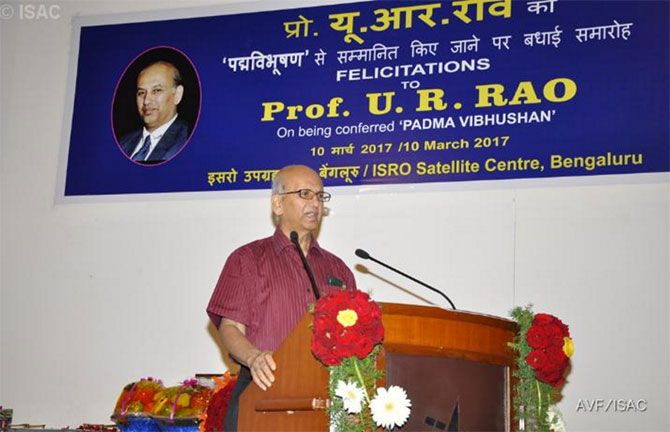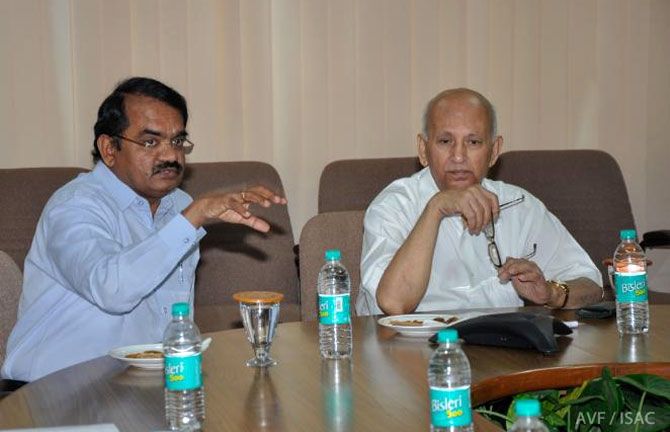 | « Back to article | Print this article |
'One remembers Professor Rao with fondness as the man who gave the space programme a very professional front face, a very different appearance from the raw energy of a Vikram Sarabhai or the polished passion of a Dr Satish Dhawan.'
M D Riti remembers U R Rao, the space pioneer who passed into the ages on Monday, July 24.

A dapper, short man, who seemed almost dwarfed by the huge desk he sat behind.
That was the first impression you got of Professor U R Rao when you walked into the chairman's office at the ISRO headquarters at Bangalore.
The next thing that struck you was his bland, almost impersonal professionalism.
For a journalist like me, who always liked to connect to the human being inside the interviewee, this always felt like a stone wall.
I had to always remind myself that that was not what it was.
It was an organisational leader who just never shed his professional hat.
I have seen Professor Rao at countless events over many years. And this was always his demeanour.
Smiling. Bland. Professional. Articulate. He
was a physicist and scientist, and not an engineer like most of his colleagues.
He was also called only 'Professor', and not 'Doctor', although he had a PhD, because he had started his career as a lecturer in Mysore and Ahmedabad.
You could meet Professor Rao as many times as you liked. He would still greet you with the same slightly distant smile and manner, although he would, of course, display his recognition of you.
It made me do my background research all the better before I approached him, and always heightened my own awareness of my lack of technical knowledge.
Covering the space programme was always a scary proposition for a generalist journalist, simply because it was all about cutting edge technology, gigantic budgetary allocations and even often about hidden international political agendas.
For example, it was during Professor Rao's tenure that the Glavkosmos deal between India and Russia, on cryogenic engine technology transfer fell through, and we were all busy wondering just how effectively India would be able to recover potentially lost ground and make this engine completely indigenously.
As a member of the fourth estate, in every sense of that concept, we journalists of that era always felt we must play devil's advocate, and explore whether the huge money spends on the space programme were really justified.

In the decade that Professor Rao headed the programme, some of the most spectacular ocean dives by satellites and launch vehicles actually happened. (My two little nephews had christened the SLVs as Sea Loving Vehicles instead of Satellite Launch Vehicles, in those days!)
Professor Rao would meet the media with that slight characteristic frown and the ready smile, alternating between the two based on the questions he was being asked.
He always came across more as an organisation head than a technology man, because that was exactly what he was.
And finally in 1992, the successful launches began.
When Dr K Kasturirangan took over as ISRO head, it was a complete shift of styles, to a very down-to-earth space scientist who looked like he would be more at home behind a console than behind the dapper Professor Rao's desk.
Finally, there was a man who looked at you with a smile of recognition in his eyes. Professor Rao then moved on to the role of distinguished space programme mentor.
One remembers Professor Rao with fondness as the man who gave the space programme a very professional front face, a very different appearance from the raw energy of a Vikram Sarabhai or the polished passion of a Dr Satish Dhawan.
I began my journalistic engagement with the space programme during Professor Rao's long tenure, and he will always be the face I remember behind the big desk.